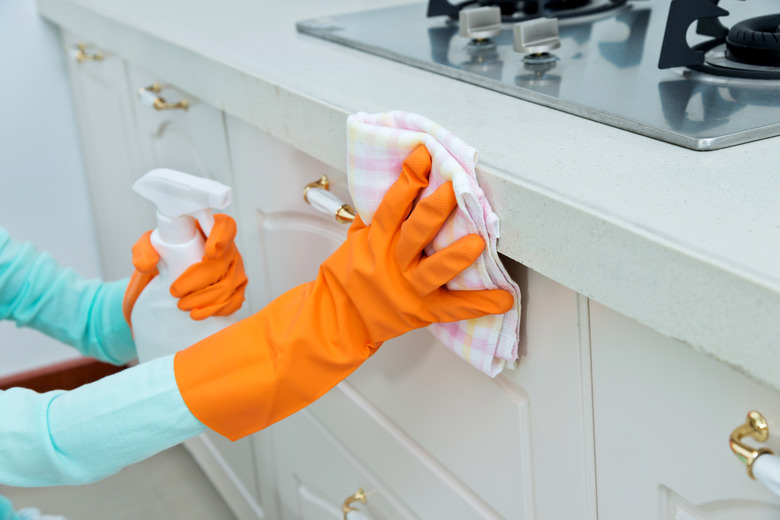How To Remove A Rotten Potato Smell From A Cabinet
There's nothing plesant about finding rotten fruit or vegetables in a kitchen cupboard or pantry. Usually alerted by a foul odor, you often find soggy, sticky messes to clean, which can sometimes stain certain surfaces, depending on both the food item and how long it's been sitting.
Rotten potatoes, for one, emit an especially strong and awful smell, and should be cleaned as soon as possible for a number of reasons. When left to rot, potatoes can become toxic.
Cleaning Rotten Potatoes
Cleaning Rotten Potatoes
Ridding your cabinet of the smell that comes with rotten potatoes can take a little time, but it is important if you want to keep the integrity of your cabinets in check and your personal health in the best possible shape. Potatoes, like other nightshades, naturally contain a toxin called solanine. Solanine is safe in small amounts, but the fumes created from high levels of this substance can be poisonous if they are inhaled. To reduce the risk of solanine poisoning, toss any potatoes that are soft and mushy, have sprouted eyes or are especially green in color.
A mess of rotten potatoes can also cause long-lasting damage to cabinet surfaces. Leaking potatoes can stain the bottoms of cabinets and even certain types of flooring if they're left on the ground, which may require sanding to restore back to new. Not to mention, many rotten potatoes smell like chemicals and can leave you with that unpleasant, lingering odor. But the smell can be removed by using a few basic, household ingredients.
How to Remove the Odor
How to Remove the Odor
To begin the deodorizing process, you'll need to throw out any potatoes that are rotten or close to rotten. Because fumes from rotten potatoes can be toxic when inhaled, toss these potatoes in a trash receptable outside.
Once your cabinet is empty, you can use a bit of dish soap and warm water to remove any remaining residue that your rotten potatoes may have left behind. After your cabinet has been wiped clean, leave any doors to the cupboard open so that the surface can begin to dry and help ventilate the area of any odors or built-up gases.
Vinegar, which contains acetic acid, is used by many as a natural deodorizer and can even kill some germs if the acetic acid percentage is 5% or more. To banish smells in your cabinet, mix about 1 part white vinegar with 2 parts water in a spray bottle and shake well. Then, spray the solution directly onto the affected area, allowing it to sit overnight before wiping clean with a wet cloth. This works well to get rid of rotten fruit smell, too.
If you're dealing with a particuarly stubborn odor or if you have a stain in your cabinet that soap and water won't lift, you can scrub the area with baking soda, a small amount of water and a sponge.
How to Preventing Future Rotting
How to Preventing Future Rotting
In an ideal world, you would never let your fruit or vegetables go bad, but sometimes, it happens. One way to reduce your chances of having to clean up soggy, rotten messes — and the smells that sometimes come with them — is by taking proper care with storage.
Storing potatoes in a cool, dark place like a basement or shed will not only make them last longer, but also preserves the vitamin C naturally found in them. Instead of keeping your potatoes in the plastic bags they're often sold in, allow them to breathe by keeping them in a bowl or paper bag far away from other fruit and vegetables, which may make them ripen faster.
